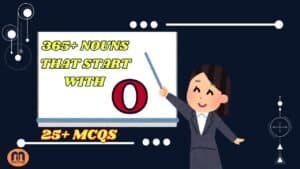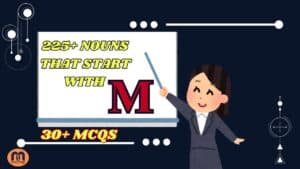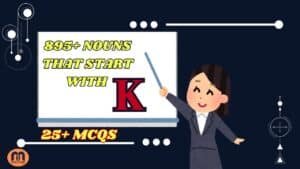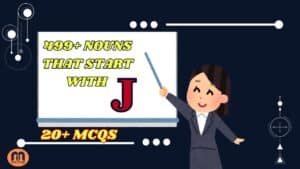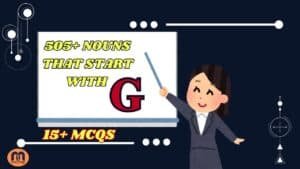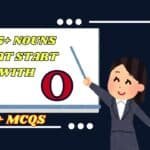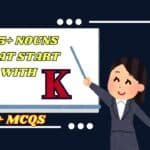Verbs That Start With F: Verbs are the heartbeat of any language. They bring sentences to life, turning passive ideas into active experiences.
When it comes to expanding your vocabulary, knowing a wide range of verbs can significantly enhance your communication skills whether you’re writing, speaking, or simply engaging in casual conversation.
One particular letter, “F,” offers a treasure trove of verbs that can bring vivid action and meaning to your language.
In this article, we will explore 655+ verbs that start with F, diving into their meanings, uses, and some intriguing examples to enrich your vocabulary.
Why Knowing a Variety of Verbs Matters
Imagine reading a story or listening to a speech where every sentence uses the same verbs. It would likely feel flat, repetitive, and unengaging.
However, by incorporating a broader range of action words, you can:
- Improve clarity: Specific verbs convey exact actions or states, making your sentences more precise and impactful.
- Enhance expression: A diverse verb vocabulary helps you articulate thoughts and emotions in unique and nuanced ways.
- Engage your audience: Variety in verb choices can captivate listeners and readers, keeping them hooked.
With over 655+ verbs starting with the letter F, you can quickly enrich your language and communicate with more flair and accuracy.
A Deep Dive into “F” Verbs
Here’s a breakdown of some common and unique verbs that start with “F,” divided into different categories for clarity.
Action-Oriented Verbs
Action verbs describe physical movements or processes that drive the action in a sentence. They are key to bringing energy and detail into both written and spoken language, making your expressions clear and engaging.
- Facilitate
- Falter
- Fend
- Fetch
- Fall
- Flap
- Flare
- Fly
- Fold
- Fry
- Fix
- Fasten
- Fire
- Flick
- Flinch
- Freeze
- Float
- Fumble
- Flip
- Fluff
- Furl
- Fracture
- Fray
- Freckle
- Funnel
- Foil
- Flinch
- Fudge
- Frown
- Flash
- Frisk
- Flop
- Flicker
- Flutter
- Fixate
- Funnel
- Foreshadow
- Falter
- Furl
- Flourish
- Frame
- Flick
- Flinch
- Fudge
- Frown
- Freeze
- Fill
- Feed
- Faint
- Fold
- Fracture
- Form
- Fly
- Fetch
- Fall
- Fumble
Mental and Emotional Verbs
These verbs are related to internal states, thoughts, feelings, and emotions. They allow you to express psychological experiences, making them especially important in storytelling or personal reflections.
- Fantasize
- Feel
- Fret
- Forgive
- Frown
- Flatter
- Fear
- Flinch
- Fantasize
- Fascinate
- Freeze
- Fidget
- Feel
- Frustrate
- Freight
- Fume
- Flash
- Festoon
- Fixate
- Fell
- Fond
- Forsake
- Fawn
- Falter
- Feather
- Fool
- Fear
- Flatter
- Flock
- Frown
- Freight
- Fudge
- Fantasize
- Frown
- Fidget
- Fume
- Frustrate
- Frisk
- Freeze
- Faint
- Freak
- Fool
- Flinch
- Finesse
- Falter
- Favor
- Fawn
- Fret
- Feast
- Frown
- Feel
- Foster
- Fixate
- Fritter
Creation and Change Verbs
These verbs describe the processes of creation, transformation, or alteration. They are crucial in contexts that involve growth, innovation, or any type of change, whether physical, emotional, or conceptual.
- Fashion
- Form
- Foster
- Fluctuate
- Flourish
- Fragment
- Fuse
- Flatten
- Fructify
- Franchise
- Fuel
- Flex
- Funnel
- Found
- Facilitate
- Frame
- Furbish
- Fix
- Formulate
- Fledge
- Fuse
- Flourish
- Finesse
- Fertile
- Fabricate
- Franchise
- Foster
- Fluctuate
- Fructify
- Flicker
- Fold
- Flare
- Flop
- Fixate
- Fluff
- Float
- Fill
- Fix
- Fuel
- Forge
- Fray
- Furnish
- Fuse
- Franchise
- Fractal
- Fray
- Flatten
- Fend
- Fix
- Fertilize
- Foster
- Flap
- Feed
- Foment
Social Interaction Verbs
Social interaction verbs are used to describe the actions that occur between people, whether in positive or negative contexts. These verbs highlight relationships, communication, and actions in a social setting.
- Facilitate
- Feud
- Flatter
- Flock
- Friend
- Feast
- Foster
- Fawn
- Festoon
- Favor
- Fiddle
- Forage
- Fend
- Finesse
- Follow
- Flicker
- Flirt
- Fawn
- Flounder
- Fetch
- Feast
- Fend
- Fold
- Fix
- Fawn
- Fret
- Frisk
- Fool
- Fend
- Freight
- Fawn
- Fool
- Flock
- Fool
- Fixate
- Funnel
- Finesse
- Flounder
- Frown
- Fidget
- Flee
- Fix
- Fray
- Fix
- Fond
- Follow
- Foster
- Fool
- Fret
Verbs for Everyday Life
These verbs are commonly used in daily life, often referring to actions that happen routinely or tasks that require minimal thought. They can be used in both informal and formal language.
- Fold
- Fix
- Fill
- Freeze
- Floss
- Flush
- Feast
- Fasten
- Flinch
- Feather
- Fill
- Fry
- Fold
- Flush
- Fix
- Fluff
- Frown
- Fumble
- Flick
- Flap
- Fumble
- Fetch
- Fix
- Fold
- Freeze
- Flick
- Fill
- Fixate
- Fret
- Flop
- Fumble
- Flick
- Fold
- Fasten
- Fluff
- Frighten
- Frizzle
- Fawn
- Fixate
- Fray
- Fumble
- Freckle
- Flicker
- Fleece
- Fray
Verbs for Nature and Movement
Nature and movement verbs are great for expressing actions related to physical movement, weather, animals, or the environment. These verbs evoke imagery of motion, change, and life in nature.
- Float
- Fly
- Flee
- Fray
- Fracture
- Flare
- Flinch
- Flutter
- Flap
- Flow
- Freeze
- Flicker
- Fleece
- Frizzle
- Funnel
- Frost
- Fumble
- Flick
- Flee
- Fleece
- Frizzle
- Flee
- Flick
- Furrow
- Flicker
- Frost
- Flow
- Fly
- Fray
- Flee
- Flit
- Frizzle
- Fawn
- Fray
- Flap
- Foster
- Flick
- Frolic
- Flee
- Fracture
- Flutter
- Flap
- Float
- Flinch
Fuel Action with Powerful Verbs
Action verbs drive your sentences and make them come to life. They describe physical movements and processes, enabling you to convey energy and activity. Whether it’s a simple task or a dynamic event, action-oriented verbs are essential for clarity and impact.
- Facilitate
- Falter
- Fend
- Fetch
- Fall
- Flap
- Flare
- Fly
- Fold
- Fry
- Fix
- Fasten
- Fire
- Flick
- Flinch
- Freeze
- Float
- Fumble
- Flip
- Fluff
- Furl
- Fracture
- Fray
- Freckle
- Funnel
- Foil
- Flinch
- Fudge
- Frown
- Flash
- Frisk
- Flop
- Flicker
- Flutter
- Fixate
- Funnel
- Foreshadow
- Falter
- Furl
- Flourish
- Frame
- Flick
- Flinch
- Fudge
- Frown
- Freeze
- Fill
- Feed
- Faint
- Fold
- Fracture
- Form
- Fly
- Fetch
- Fall
- Fumble
- Flick
- Flinch
Express Emotions with Impactful Verbs
Emotional verbs are the gateway to expressing feelings, thoughts, and states of mind. These verbs enable you to communicate mental and emotional experiences, whether it’s joy, fear, or frustration, helping you articulate complex emotional landscapes.
- Fantasize
- Feel
- Fret
- Forgive
- Frown
- Flatter
- Fear
- Flinch
- Fantasize
- Fascinate
- Freeze
- Fidget
- Feel
- Frustrate
- Freight
- Fume
- Flash
- Festoon
- Fixate
- Fell
- Fond
- Forsake
- Fawn
- Falter
- Feather
- Fool
- Fear
- Flatter
- Flock
- Frown
- Freight
- Fudge
- Fantasize
- Frown
- Fidget
- Fume
- Frustrate
- Frisk
- Freeze
- Faint
- Freak
- Fool
- Flinch
- Finesse
- Falter
- Favor
- Fawn
- Fret
- Frisk
- Fool
- Fend
- Fixate
- Fray
- Fritter
Shape Change with Transformative Verbs
Verbs related to creation, transformation, and change allow you to express the development of ideas, objects, or situations. These verbs can help convey the act of building, evolving, or shifting from one state to another.
- Fashion
- Form
- Foster
- Fluctuate
- Flourish
- Fragment
- Fuse
- Flatten
- Fructify
- Franchise
- Fuel
- Flex
- Funnel
- Found
- Facilitate
- Frame
- Furbish
- Fix
- Formulate
- Fledge
- Fuse
- Flourish
- Finesse
- Fertile
- Fabricate
- Franchise
- Foster
- Fluctuate
- Fructify
- Flicker
- Fold
- Flare
- Flop
- Fixate
- Fluff
- Float
- Fill
- Fix
- Fuel
- Forge
- Fray
- Furnish
- Fuse
- Franchise
- Fractal
- Fray
- Flatten
- Fend
- Fix
- Fertilize
- Foster
- Flap
- Feed
- Foment
Engage in Meaningful Connections through Verbs
Social interaction verbs are the foundation of building relationships and communication. These verbs allow you to convey actions between people, from simple exchanges to deeper connections, helping to foster relationships and understanding.
- Facilitate
- Feud
- Flatter
- Flock
- Friend
- Feast
- Foster
- Fawn
- Festoon
- Favor
- Fiddle
- Forage
- Fend
- Finesse
- Follow
- Flicker
- Flirt
- Fawn
- Flounder
- Fetch
- Feast
- Fend
- Fold
- Fix
- Fawn
- Fret
- Frisk
- Fool
- Fend
- Freight
- Fawn
- Fool
- Flock
- Fool
- Fixate
- Funnel
- Finesse
- Flounder
- Frown
- Fidget
- Flee
- Fix
- Fray
- Fix
- Fond
- Follow
- Foster
- Fool
- Fret
Navigate Everyday Life with Essential Verbs
Everyday life is filled with routine tasks, simple chores, and activities that keep the world moving. These verbs describe actions that are part of daily life, making it easier to express the activities that keep us productive and engaged.
- Fold
- Fix
- Fill
- Freeze
- Floss
- Flush
- Feast
- Fasten
- Flinch
- Feather
- Fill
- Fry
- Fold
- Flush
- Fix
- Fluff
- Frown
- Fumble
- Flick
- Flap
- Fumble
- Fetch
- Fix
- Fold
- Freeze
- Flick
- Fill
- Fixate
- Fret
- Flop
- Fumble
- Flick
- Fold
- Fasten
- Fluff
- Frighten
- Frizzle
- Fawn
- Fixate
- Fray
- Fumble
- Freckle
- Flicker
- Fleece
- Fray
Capture Nature’s Movement with Dynamic Verbs
Nature’s rhythms and movements can be beautifully expressed through dynamic verbs. These verbs capture the energy of the natural world, from the movement of animals to the flow of water and the changes in the weather.
- Float
- Fly
- Flee
- Fray
- Fracture
- Flare
- Flinch
- Flutter
- Flap
- Flow
- Freeze
- Flicker
- Fleece
- Frizzle
- Funnel
- Frost
- Fumble
- Flick
- Flee
- Fleece
- Frizzle
- Flee
- Flick
- Furrow
- Flicker
- Frost
- Flow
- Fly
- Fray
- Flee
- Flit
- Frizzle
- Fawn
- Fray
- Flap
- Foster
- Flick
- Frolic
- Flee
- Fracture
- Flutter
- Flap
- Float
- Flinch
Adjectives That Often Pair with “F” Verbs
A well-rounded vocabulary also involves knowing which adjectives pair best with certain verbs. Here are a few to keep in mind:
- Fluent: Often used with verbs like “speak” or “communicate” (e.g., fluent in French).
- Fierce: Used with verbs like “fight” or “compete” (e.g., a fierce battle).
- Favorable: Often used with “view” or “outlook” (e.g., a favorable opinion).
- Fleeting: Associated with verbs like “moment” or “glance” (e.g., a fleeting moment).
- Frantic: Often paired with “rush” or “search” (e.g., a frantic search).
Creative Expressions with F Verbs
Sometimes, the best way to expand your vocabulary is by getting creative with how you use verbs. Here are some expressions you can play around with:
- Feeding off: Used to describe someone thriving on something, like energy or attention.
- Flipping through: Refers to quickly scanning pages or looking through something.
- Falling for: A phrase that can describe someone’s emotional involvement with a person or idea.
Wrapping Up: Verbs That Start With F
By incorporating these 655+ verbs that start with “F,” you not only enhance your writing and speaking abilities but also deepen your understanding of how words shape meaning.
Whether you’re crafting a compelling narrative, delivering a presentation, or simply trying to spice up your daily conversations, these verbs offer a world of possibility.
So, why not start using some of these today? Challenge yourself to integrate just a few “F” verbs into your vocabulary each week. You’ll soon notice your language becoming more dynamic and expressive, all thanks to the powerful action words that begin with the letter F.
Next time you’re about to write or speak, consider reaching for one of these verbs to elevate your message. What verb do you think would best describe your day today?
MCQs: Verbs That Start With F
1. Which of the following verbs would best fit an action-oriented context?
A) Flatter
B) Facilitate
C) Feel
D) Forgive
Answer: B) Facilitate
2. Which verb is most appropriate to express an emotional reaction in a sentence?
A) Flick
B) Fret
C) Fold
D) Flap
Answer: B) Fret
3. Which verb indicates the act of creating or changing something in a transformative way?
A) Fawn
B) Fuel
C) Finesse
D) Fixate
Answer: B) Fuel
4. Which verb would you use to describe a social action or interaction between people?
A) Flow
B) Flatter
C) Freeze
D) Fumble
Answer: B) Flatter
5. Which verb would be used for an everyday routine action?
A) Flick
B) Flock
C) Flush
D) Fend
Answer: C) Flush
6. Which of the following verbs best describes the movement of an object or animal in nature?
A) Fold
B) Freeze
C) Fly
D) Fumble
Answer: C) Fly
7. Which verb would best fit when describing the act of being involved in a deep emotional state?
A) Forgive
B) Fume
C) Flinch
D) Flicker
Answer: B) Fume
8. Which verb could be used to describe a change in physical form or structure?
A) Fructify
B) Flee
C) Fluff
D) Fray
Answer: A) Fructify
9. Which verb would be appropriate when discussing creating or forming an idea or concept?
A) Fray
B) Foster
C) Fold
D) Frown
Answer: B) Foster
10. If someone is engaging in casual conversation or making friends, which verb would be most fitting?
A) Fluff
B) Fret
C) Friend
D) Freeze
Answer: C) Friend
11. Which verb is best used when describing the movement of water or air?
A) Fumble
B) Flow
C) Flicker
D) Fray
Answer: B) Flow
12. Which verb would best describe an action indicating confusion or lack of direction?
A) Fix
B) Flounder
C) Flinch
D) Flourish
Answer: B) Flounder
13. Which verb would best describe a mental state of deep concentration or obsession?
A) Fawn
B) Fixate
C) Fidget
D) Frolic
Answer: B) Fixate
14. Which verb represents the act of organizing or arranging something methodically?
A) Flap
B) Fold
C) Flee
D) Flock
Answer: B) Fold
15. Which of the following verbs would be used to describe physical discomfort or a sudden reaction?
A) Frown
B) Flinch
C) Fluff
D) Fray
Answer: B) Flinch
16. Which verb would be used to describe the act of preventing or stopping something from happening?
A) Fix
B) Fend
C) Flick
D) Flock
Answer: B) Fend
17. Which verb would you use when describing the act of moving quickly from one place to another?
A) Flee
B) Flutter
C) Fixate
D) Fume
Answer: A) Flee
18. Which verb would you use to describe an action that signifies a sudden, noticeable change in the environment?
A) Flare
B) Fold
C) Fix
D) Fray
Answer: A) Flare
19. Which verb would best describe an action that represents something gradually becoming more complex or detailed?
A) Finesse
B) Flap
C) Flock
D) Flicker
Answer: A) Finesse
20. Which of the following verbs would be most appropriate for describing an animal or person engaging in playful behavior?
A) Flap
B) Frolic
C) Frown
D) Fume
Answer: B) Frolic
Read more knowledgeable blogs on Entry Mags


